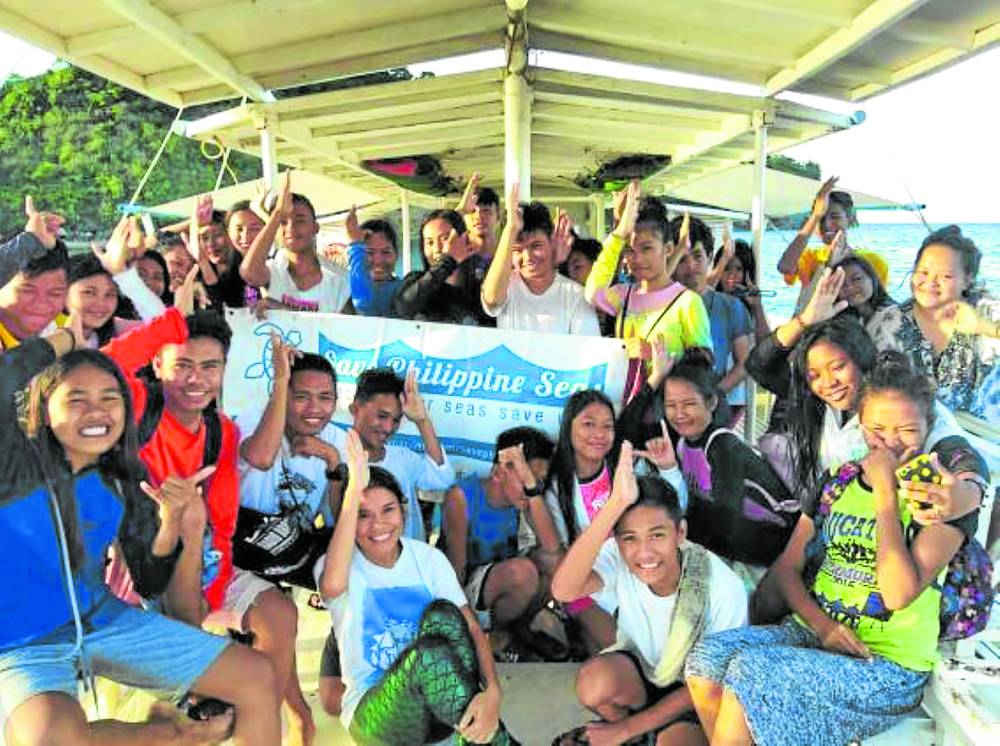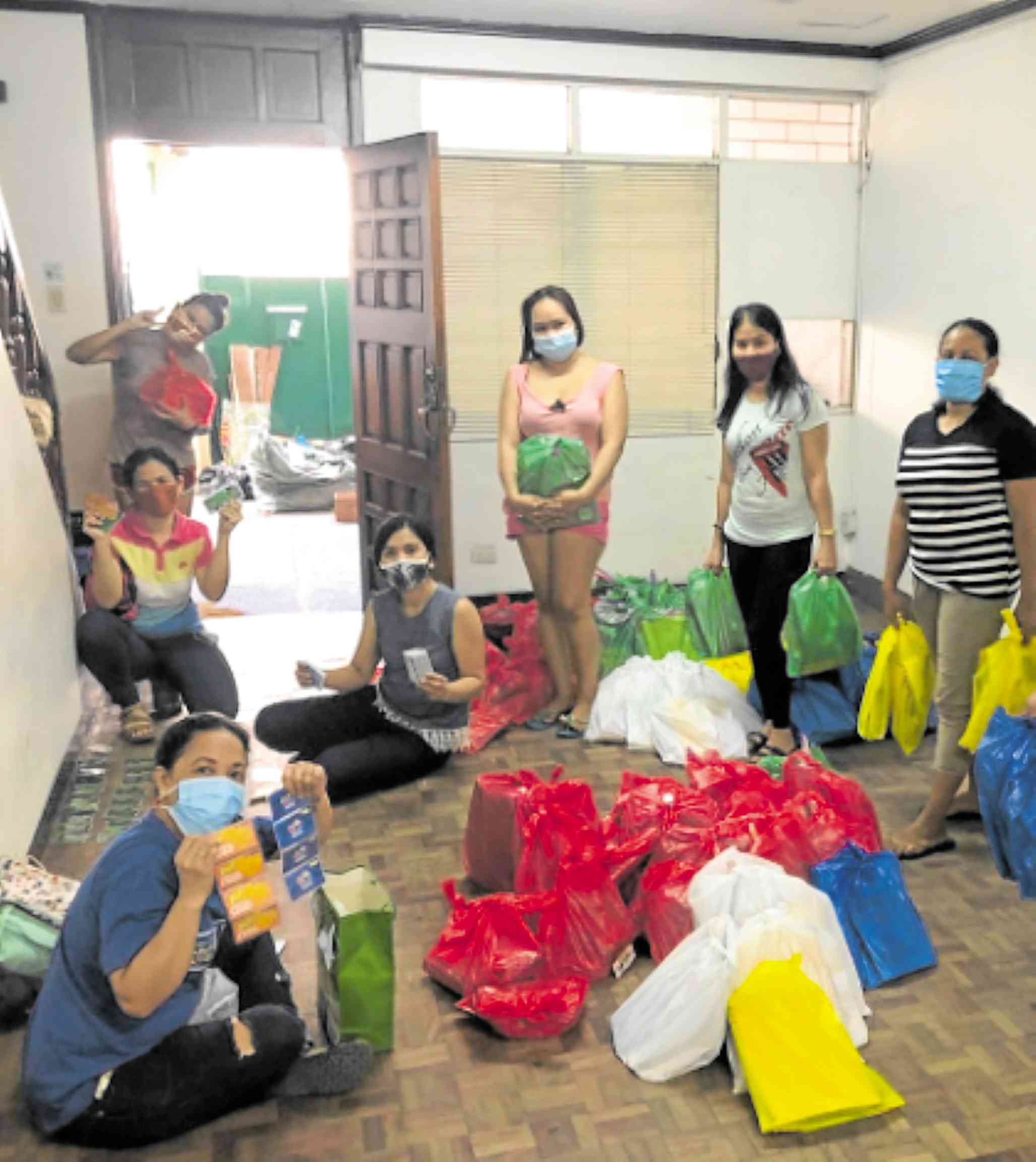
COLLECTIVE POWER Save Philippine Seas’ successful conservation efforts are built upon a grassroots approach that leverages community involvement, resulting in support not only at the national level but also internationally. —SAVE PHILIPPINE SEAS
In a country where education and environmental challenges loom large, two millennial leaders are making a mark: Jaton Zulueta, who started his education advocacy teaching street kids at Manila South Cemetery, and Anna Oposa, a “mermaid” at heart who aims to turn every Filipino into a “sea-tizen.”
Both have dedicated their lives to creating sustainable solutions to the ills of society. Zulueta, 38, founder of AHA! Learning Center, addresses education inequity while 35-year-old Oposa, cofounder of Save Philippine Seas (SPS), fights for marine conservation.
The two have been selected to join Ashoka’s dynamic global community of social entrepreneurs dedicated to creating positive change across various fields. Ashoka describes its fellows, numbering more than 3,500 across 93 countries to date, as those who “champion new ideas that transform society’s systems—providing benefits for everyone and improving the lives of millions of people.” They are deemed as the “ultimate role models in today’s world.” There are only 16 Filipino Ashoka fellows at present.
A nonprofit based in Virginia, United States, Ashoka equips its fellows with financial support, expert guidance, connections and a powerful platform to magnify the impact of their work.

UNFAZED At the height of the pandemic, AHA! Learning Center gave out learning supplies via its volunteer network of parents. —PHOTOS BY AHA! LEARNING CENTER
Empowering the underserved through education
Erika Tatad, venture manager at Ashoka Philippines, explains that candidates go through multiple rounds of interviews to ensure their credibility, ethics and sustainability of their organization. “We need to be thorough in the process because an Ashoka fellowship is a lifetime commitment,” she says.
Zulueta’s mother encouraged him to volunteer by teaching at a graveyard where street kids lived. As he himself struggled with math, he developed a deep sense of empathy for out-of-school children who had fallen behind their peers. When he began teaching, he realized he wasn’t bad at math but that he just wasn’t being taught in a way he could excel. He dedicated his free time and weekends to teaching at the graveyard from age 19, when he was a college student.
Zulueta founded AHA! Learning Center, an after-school tutorial program in Makati in 2009. Going beyond the common models of tutoring, he is committed to stay long enough with students to make a difference in their learning journey.
According to Ashoka, AHA! “become more than a weekend tutoring program and became a true center for children, parents, families and teachers to create deep transformations in themselves, and give themselves permission to dream and be the change.”
“There seems to be a gap [in the quality of education]. It looks like there’s no hope [in underserved communities],” he says in an interview with Inquirer. “Our goal is to eradicate illiteracy.”
In 2018, Zulueta decided to commit his full attention to AHA! and expand it, gaining recognition and awards such as The Outstanding Young Men (TOYM) and Obama Foundation Fellow.
“No one wants to be on it [the idea] unless there’s a proof of concept,” says Zulueta.
To date, AHA! has reached more than 168,000 children with its network of 25 school partners in the poorest areas in the Philippines.
When the pandemic hit, it threatened to upend all of Zulueta’s hard work. However, he didn’t back down; he mobilized his team for emergency solutions to ensure that access to education would not be disrupted. He quickly crowdsourced across his networks. Hundreds of Filipinos volunteered their resources, time and skills to create modules and train teachers.
Aside from the reaching out to communities amid the pandemic restrictions, Zulueta and AHA! came up with Eskwelang Pamilya, an educational program that uses Facebook Messenger to connect with parents and children. The program uses text-based methods to educate and provide resources to those in need. AHA! also broadcasts lessons through a daily radio program that serves as an alternative classroom for students.
“Our country is worth working for,” says Zulueta. “The difficult thing oftentimes [with this line of work] is that it takes a lot of courage; 90 percent of it is showing up and connecting with the communities.”
Zulueta has a lot of plans for the future of AHA!. But for now, he is focused on reaching more provinces and communities to make sure that change is felt nationwide.Being an Ashoka fellow, he says, “doesn’t just validate what we do but emboldens us to do even better,” he says.
Saving the seas
For Oposa, every Filipino must become a “sea-tizen,” a portmanteau of the words sea and citizen, one who is actively engaged in protecting the seas. Her official title at SPS—“chief mermaid”—speaks volumes about her mission.
“My work has definitely been cut out for me,” Oposa shares with the Inquirer. From a young age, she fell in love with the ocean. Her father, Antonio “Tony” Oposa, a well-known environmental lawyer and 2009 Ramon Magsaysay honoree, has instilled in her the responsibility of protecting the environment.
In 2008, during a summer break from college at the University of the Philippines (UP), Oposa assisted her father in organizing an event called the Global Legal Action of Climate Change. It was there that she realized the true potential of individual and collective action. No matter how small the initiative, one can make an impact.
Once back in school, Oposa cofounded Isko Cleans UP, an organization that aims to reduce waste and promote recycling through monthly fairs and workshops. Thanks to her initiative, UP banned the use of styrofoam and institutionalized the recyclables fair. Realizing that much of climate change literature is Western-centric, Oposa co-authored the book “An Introduction to Climate Change for Filipino Youth” to make the topic more relatable to young people.
A few months prior to graduation, Oposa was chosen to join the Philippine delegation to the UN Climate Change Conference, gaining her first experience in multilateral negotiations.
In 2011, Oposa was deeply disturbed by illegal wildlife trade. She began writing to peers, local leaders and even strangers, starting an online campaign. She quickly became the face of the advocacy and by 2012, became the youngest winner of the Future for Nature Award. Through this program, she was able to create the Shark Shelter Project in Cebu and establish SPS as a thriving organization.
Shark Shelter Project, a community-based initiative on the island of Malapascua, implemented a “full value chain approach” that included education, livelihoods, resource mobilization and policy
work, empowering locals to protect marine life.
Oposa recalls her first ever experience in reaching out to communities, “I was really young and naive and I thought marine conservation was easy. But it was really hard to do as most of them didn’t care. They [the locals] were just there for the food and beer.” In order for her advocacy to come through, she spent countless weeks and months immersing into the communities.
Oposa served as lead campaigner for a shark conservation bill. Her efforts led to additional national protection for shark and ray species. She also conducts research, analysis, information management and communications work to support the development of ocean health-related agenda of the Asian Development Bank. She has previously worked on the multilateral
bank’s projects related to the youth, curbing illegal wildlife trade and environmental education.
She also established SPS’s youth program, the Sea and Earth Advocates Camp, the first environmental education and leadership program of its kind in the Philippines. Just like her father, Oposa also became a TOYM honoree in 2022.

